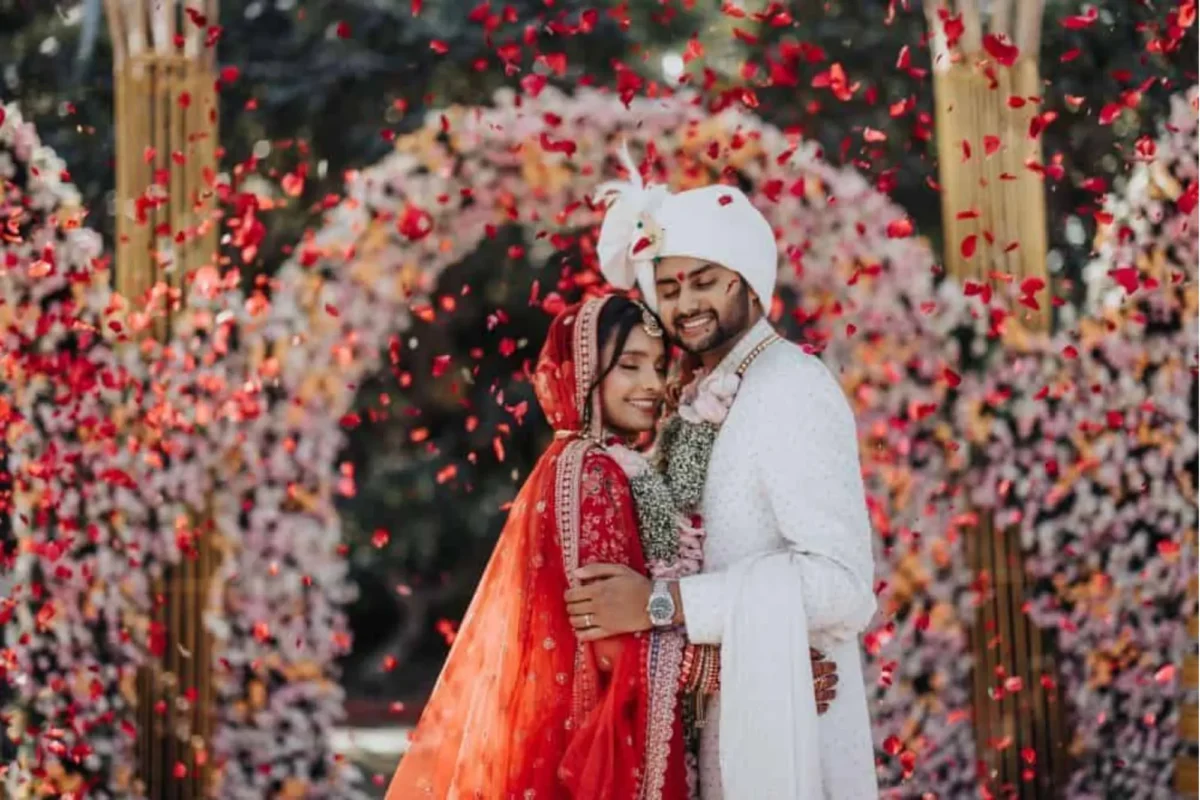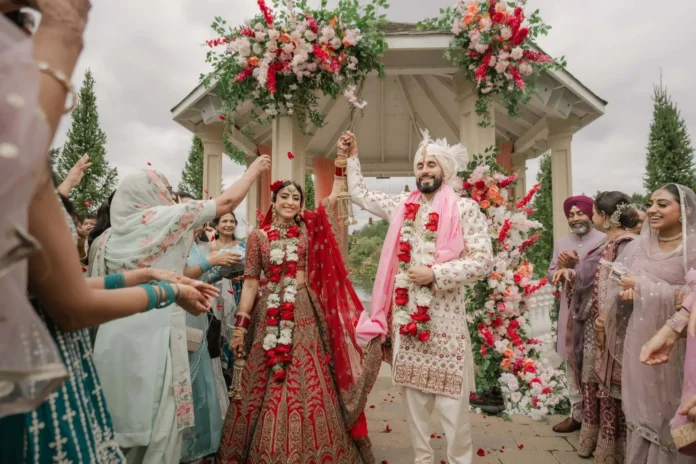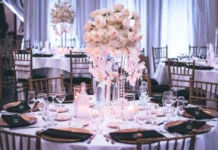Wedding planning asks for a lot—a lot of time, a lot of commitment, and a lot of important decisions. Let us help you with a checklist.
Planning a wedding is one of the most exciting journeys a couple can embark on — but it can also be one of the most overwhelming. Between selecting the perfect venue, deciding on the décor theme, finalising the guest list, and managing countless vendors, it’s easy to feel lost. That’s where a wedding planning checklist comes in handy. Whether you’re hosting a grand celebration or opting to plan your destination wedding, this step-by-step guide by Team Wedding Affair will help you make the most important decisions with confidence and clarity.
Table of Contents
- Setting the Foundation: Budget and Vision
- Choosing the Date and Venue
- Finalising the Guest List
- Selecting Key Vendors
- Designing the Wedding Theme and Décor
- Planning the Wedding Attire
- Organising Invitations and Communication
- Managing Food, Drinks, and Cake
- Entertainment and Experience Planning
- Destination Wedding Planning Essentials
- Final Weeks: Last-Minute Preparations
Setting the Foundation: Budget and Vision
Before diving into details, start with two key decisions — your budget and vision. Sit down as a couple and discuss what kind of wedding you both envision: intimate and cosy, royal and grand, or chic and modern.
Once you have a clear vision, set a realistic budget. Allocate funds for major categories such as venue, catering, outfits, photography, and décor. This not only prevents overspending but also helps prioritise what truly matters. Remember, wedding planning is about creating meaningful experiences, not just lavish expenses.
Choosing the Date and Venue
Your wedding date will influence almost every other decision. Consider factors such as:
- Seasonal weather
- Availability of venues
- Family and cultural preferences
- Festivals or holidays that could affect travel or booking
Once you’ve chosen your date, start researching venues. Visit multiple locations, compare amenities, and understand what’s included in their wedding packages. For those planning a destination wedding, factor in logistics such as guest accommodations, travel options, and local vendor availability.
When you plan your destination wedding, it’s best to visit the venue beforehand (or hire a local planner) to handle the details on-site.
Finalising the Guest List
Your guest list directly affects your budget, venue size, and catering. Start by listing everyone you’d like to invite — family, friends, colleagues — and then categorise them into “must-invite” and “nice-to-invite” groups.
Discuss with both families to ensure no one important is left out. Once finalised, the guest count will guide your decisions for invitations, seating, and food arrangements.
If it’s a destination wedding, consider a smaller, more intimate guest list to manage logistics more easily.
Read Also: Don’t Let These Fall Wedding Fumbles Ruin Your Big Day
Selecting Key Vendors
A wedding’s success depends heavily on the professionals behind it. The most important vendors to book early include:
- Wedding planner: Your go-to person for coordination, logistics, and creative ideas.
- Photographer and videographer: They’ll capture every magical moment — make sure their style matches your taste.
- Caterer: Great food leaves a lasting impression; sample menus before finalising.
- Makeup artist and hairstylist: Schedule trials to ensure your look aligns with your vision.
- Entertainment: From DJs to live bands, good music sets the mood for celebration.
Book your top vendors at least 8–10 months before the wedding, especially during peak seasons.
Designing the Wedding Theme and Décor
This is where your creativity truly shines. Whether you love minimalist elegance, vibrant traditional styles, or dreamy fairytale vibes, choose a theme that reflects your personalities.
Your décor theme should flow through every element — from the mandap or stage setup to table settings, lighting, and floral arrangements. Pinterest boards and mood boards are excellent tools for visualising your ideas.
Don’t forget smaller details like welcome signage, name cards, and photo booths — they make your wedding feel personal and memorable.

Planning the Wedding Attire
One of the most exciting parts of wedding planning is choosing what to wear. Brides should start shopping 6–8 months before the wedding to allow for fittings and customisations. Grooms, too, should plan their attire early, ensuring it complements the bride’s look.
Consider your wedding theme, season, and location when choosing fabrics and colours. If you plan a destination wedding in a warm climate, opt for breathable materials and lighter hues.
Accessories, footwear, and jewellery should also be finalised well in advance — small details make a big difference on your big day.
Organising Invitations and Communication
Once your date and venue are set, it’s time to send out save-the-dates — ideally 6 months before the wedding (especially if you have guests travelling).
Design your wedding invitations to reflect your theme and tone. Include clear details about the venue, dress code, and RSVP instructions.
For destination weddings, send digital invites early and follow up with travel itineraries, hotel information, and contact numbers to make the process smooth for everyone.
Managing Food, Drinks, and Cake
Food is one of the most remembered aspects of any wedding. Choose a caterer who can offer a variety of cuisines and accommodate dietary restrictions. Organise a tasting session to finalise the menu.
For drinks, decide whether you want an open bar, limited bar, or signature cocktails. And of course, the wedding cake — or dessert table — should reflect your theme and flavour preferences.
If you’re hosting multiple functions (like mehendi, sangeet, or reception), plan a unique menu for each event to keep things exciting for guests.
Read Also: Breathtaking Ideas for Table Centrepieces in Weddings
Entertainment and Experience Planning
A great wedding is about experiences. Curate entertainment that matches your celebration style — live music, a DJ, or even cultural performances.
You could also include fun experiences such as:
- Photo booths with props
- Couple games
- Personalised welcome hampers
- Fireworks or drone shows
For destination weddings, plan group activities or local tours to make the event feel like a mini-vacation for your guests.
Destination Wedding Planning Essentials
When you plan your destination wedding, the logistics become even more crucial. Here’s what to prioritise:
- Legal requirements: Check marriage laws and required documents for the chosen destination.
- Guest accommodations: Negotiate group booking rates and provide transport options.
- Local vendors: Hire reliable professionals who understand the area and customs.
- Weather prep: Always have backup options for outdoor ceremonies.
Hiring a destination wedding planner can make things seamless — they handle coordination, permits, and vendor management while you enjoy the celebration.
Final Weeks: Last-Minute Preparations
The last few weeks before your wedding can be hectic, so it’s best to stay organised:
- Confirm vendor payments and contracts
- Create a detailed wedding-day timeline
- Pack your trousseau and travel essentials
- Assign responsibilities to family or the bridal party
- Schedule beauty appointments and rest well before the big day
Most importantly, take moments to breathe, relax, and enjoy the anticipation. After all, this is a celebration of your love — not just an event to execute.
FAQs
Q1. How early should I start my wedding planning?
Ideally, start at least 12 months in advance. This gives you enough time to research, compare vendors, and make well-informed decisions without feeling rushed.
Q2. What should be my first step when I plan my wedding?
Begin with setting your budget and vision. Once you know what type of wedding you want and how much you can spend, every other decision will fall into place more easily.
Q3. Is it worth hiring a wedding planner?
Absolutely — especially if you’re hosting a large or destination wedding. A professional planner will help with wedding planning by managing logistics, coordinating vendors, and ensuring your day runs smoothly, allowing you to focus on enjoying every moment.
Read Also: 10 Food Presentation Tips to Serve Wedding Guests at Home
A wedding isn’t just a single day — it’s a journey filled with love, joy, and countless memories. With this wedding planning checklist, you’ll not only stay organised but also truly savour the process of bringing your dream celebration to life. Whether you’re hosting it in your hometown or choosing to plan your destination wedding, remember that the most beautiful part of it all is the beginning of your new life together.
So, plan your wedding and subscribe to Wedding Affair for everything wedding!






